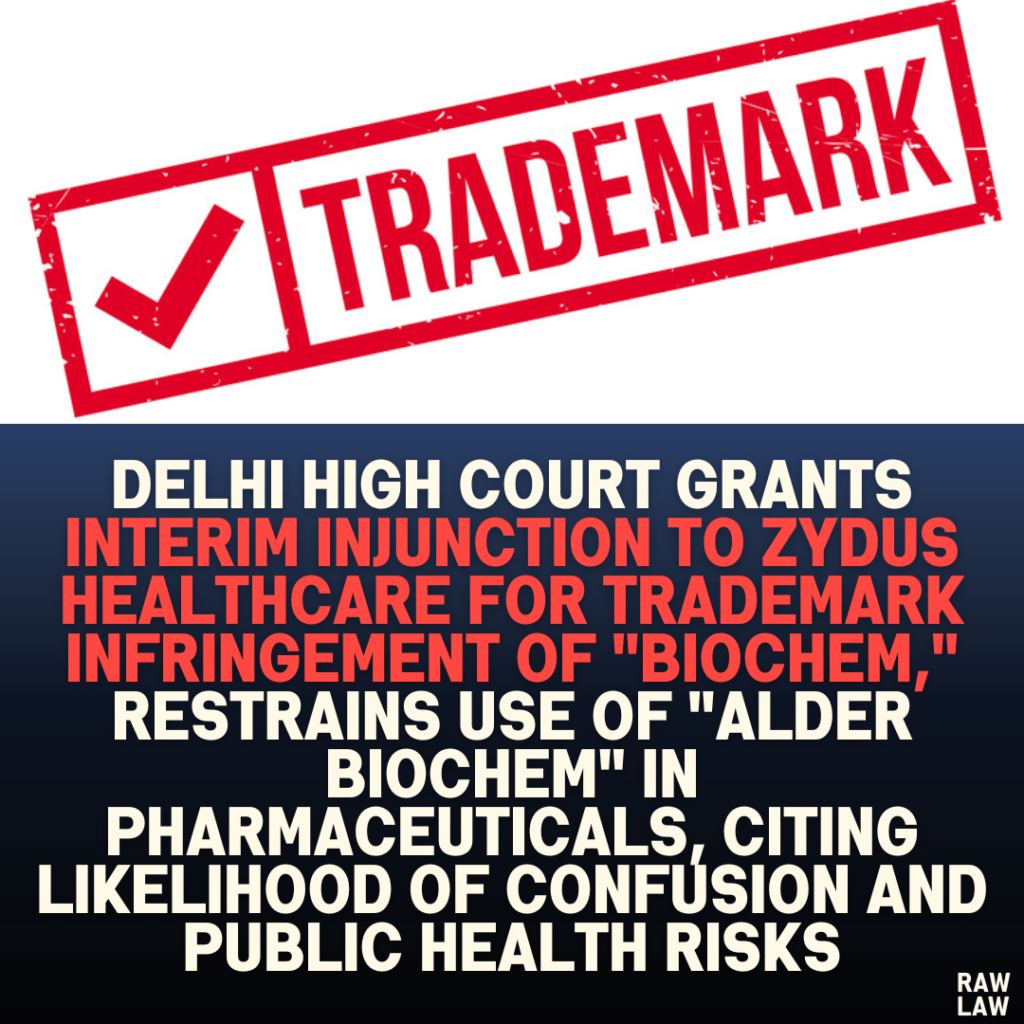Court’s Decision
The Delhi High Court granted an interim injunction in favor of Zydus Healthcare Limited, restraining Alder Biochem Private Limited from using the mark “ALDER BIOCHEM” or any deceptively similar name for pharmaceutical products. The Court held that Zydus Healthcare, owning the trademark “BIOCHEM” since 1961, demonstrated a strong prima facie case for trademark infringement and passing off. The Court emphasized the likelihood of consumer confusion, especially in pharmaceuticals, and imposed a restriction on related domain names.
Facts of the Case
- Trademark Background:
- The plaintiff, Zydus Healthcare Limited, owns the registered trademark “BIOCHEM,” first coined in 1959 by Biochem Pharmaceutical Industries and acquired by Zydus in 2017.
- The defendant, Alder Biochem Private Limited, incorporated in 2016, used “ALDER BIOCHEM” as its trade name and applied for trademark registration in 2017.
- Business Context:
- Zydus Healthcare’s products under the “BIOCHEM” brand generated revenue exceeding ₹240 crores in 2022, with a reputation for trust and quality in the pharmaceutical market.
- The defendant claimed limited sales and argued that “ALDER” was its primary mark, with “BIOCHEM” as a descriptive term.
- Cease-and-Desist Notices:
- Zydus issued notices in 2022, alleging trademark infringement and passing off.
- The plaintiff also opposed the defendant’s trademark application before the Trade Marks Registry.
- Legal Proceedings:
- The plaintiff sought an injunction citing goodwill, reputation, and public health risks from confusion between the trademarks.
- The defendant contended that “BIOCHEM” is generic, derived from “biochemistry,” and not entitled to exclusive trademark protection.
Issues
- Whether “BIOCHEM” is a generic term or has acquired distinctiveness eligible for trademark protection.
- Whether the defendant’s use of “ALDER BIOCHEM” constitutes trademark infringement and passing off.
Arguments Presented
- Plaintiff (Zydus Healthcare Limited):
- Claimed exclusive rights to the “BIOCHEM” trademark since 1961, supported by continuous use, registration, and substantial sales.
- Argued that the defendant’s mark was structurally, visually, and phonetically similar, causing consumer confusion.
- Emphasized public health risks from confusion in pharmaceutical trademarks and asserted that “BIOCHEM” had acquired distinctiveness and secondary meaning.
- Defendant (Alder Biochem Private Limited):
- Asserted that “BIOCHEM” is generic and widely used in the industry, lacking inherent distinctiveness.
- Claimed that its primary trademark was “ALDER,” with “BIOCHEM” only indicating the nature of its goods.
- Denied any likelihood of confusion due to distinct branding and argued that the injunction would disproportionately harm its business.
Court’s Observations
- Validity of “BIOCHEM” as a Trademark:
- Rejected the defendant’s claim that “BIOCHEM” is generic, holding that dictionary words can acquire distinctiveness through continuous use and reputation.
- Noted no evidence of third-party use of “BIOCHEM” in the pharmaceutical sector, supporting the plaintiff’s exclusivity claim.
- Likelihood of Confusion:
- Held that “BIOCHEM” is the dominant part of the defendant’s mark, making “ALDER BIOCHEM” deceptively similar.
- Highlighted the heightened standard for pharmaceutical trademarks, where consumer confusion could endanger public health.
- Passing Off and Infringement:
- Found that the defendant’s mark created a false association with the plaintiff’s established reputation, constituting passing off.
- Cited precedents where minor additions to a dominant mark did not negate the likelihood of confusion.
- Balance of Convenience:
- Favored the plaintiff due to its substantial sales and established goodwill under the “BIOCHEM” mark.
- Noted the defendant’s limited sales and lack of compelling evidence to justify continued use of the contested mark.
- Public Health and Consumer Safety:
- Emphasized the critical importance of preventing confusion in pharmaceutical products to protect consumer safety and trust.
Conclusion
The Court granted an interim injunction, restraining the defendant from:
- Using “ALDER BIOCHEM” or any deceptively similar mark for pharmaceutical products.
- Operating any domain names containing “BIOCHEM.”
The Court clarified that its observations were preliminary and would not affect the final adjudication of the case.
Implications
This judgment reinforces the principle that trademarks, even if derived from generic terms, can acquire distinctiveness through reputation and consistent use. It underscores the judiciary’s role in safeguarding consumer trust and public safety, particularly in pharmaceutical trademarks where confusion can have severe consequences. The ruling also highlights the importance of balancing trademark protection with equitable considerations in commercial disputes.




Pingback: Bombay High Court Denies Bail to Senior Police Inspector Accused of Criminal Conspiracy in Mansukh Hiran’s Murder Linked to Mukesh Ambani Security Threat, Finds Prima Facie Evidence of Criminal Conspiracy - Raw Law
Pingback: High Court of Jammu & Kashmir and Ladakh Appoints Arbitrator; Holds Delay and Inaction in DRB Formation Violates Contractual Obligations, Justifying Arbitration - Raw Law